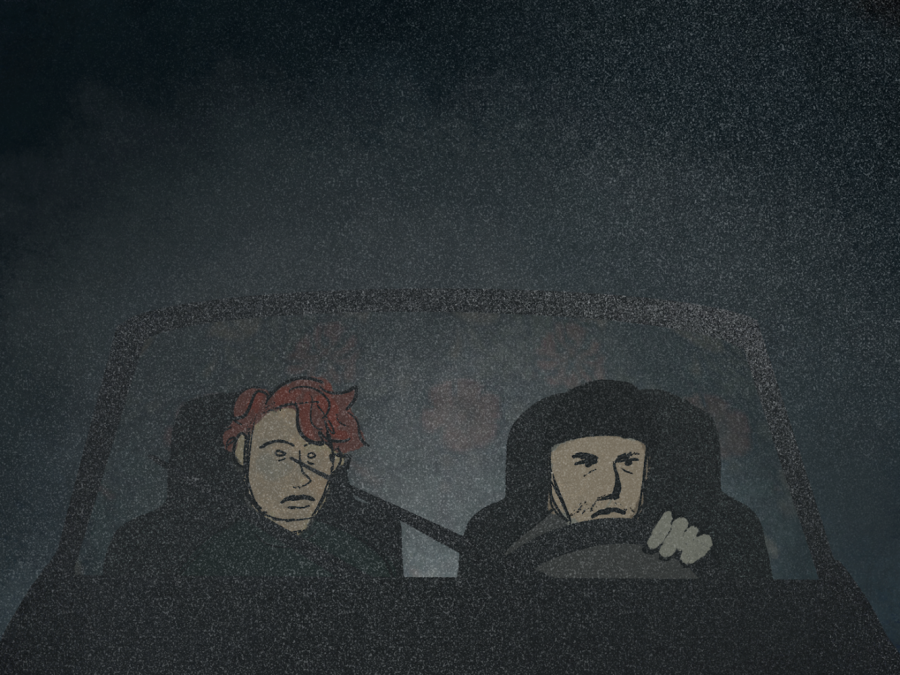In true Charlie Kaufman fashion, the director’s newest film, “I’m Thinking of Ending Things,” crafts a brilliant and rich narrative that makes very little sense. With a favorable Rotten Tomatoes score of 83% alongside a low 50% approval rating from audiences, it is evident that the reception to the film is divisive. It’s not hard to see why; the surreal, evocative imagery and the main plot of a woman meeting her boyfriend’s parents for the first time converge in disorienting ways that leave plenty of room for interpretation.
The film starts with a young woman (Jessie Buckley) and her boyfriend Jake (Jesse Plemons) engaging in a series of tense discussions about their relationship as they drive to his parents’ house. Buckley’s character, whose name shifts throughout from Lucy to Lucia to other variations, repeats a mantra in her head: “I’m thinking of ending things.” From an outsider’s perspective, it’s easy to see why. Jake undermines her intelligence more than a male Film & TV major. However, as they arrive at Jake’s childhood home, what seemed to be mere surface tension unravels into something profound and mysterious.
Polish cinematographer Lukasz Zal maintains a strict 4:3 aspect ratio that builds increasing levels of anxiety as the film progresses. Viewers are tantalized by what may be going on outside of frame, as the objects and characters in view distort in frightening ways. At Jake’s house, his parents — played beautifully by horror veterans Toni Collette and David Thewlis — change ages and moods rapidly. The young woman finds a poem in Jake’s room that mirrors her own that she recited on the car ride over. Elongated marks are left on the door to the basement. Mysterious phone calls and cuts to images of a lonely janitor amplify the viewer’s mistrust in the events unfolding.
Images and information change fluidly within the house. One second, the young woman is a professional painter, the next she’s a waitress, a poet or a quantum physicist. Some scenes cut from moments of passionate conversation to the young woman sitting in the room alone with a bewildered expression plastered on her face. A sense of wonderment is instilled: is this a real relationship? Do any of the characters even exist in the story’s world? Should I watch another movie that’s less confusing?
After they leave the house, the narrative forays into Kafkaesque territory as the vignettes of a lonely janitor and the couple’s disintegrating relationship begin to intersect in fascinating ways. At this point in the film, reality is thrown out of the picture and Kaufman gives into the pulsating magnetic core of the film: a thick thematic brew filled with musings on death, love and failure.
Many critics say the project is too esoteric. I would have to agree. With a lengthy dialogue between the couple discussing the merits of John Cassavetes’ “A Woman Under the Influence,” Kaufman manifests their intellectual power struggle while also showing off his own knowledge.
The young woman recites lines verbatim from Pauline Kael’s infamous review of the Cassavetes film, to which Jake reluctantly admits defeat by saying, “You are certainly the expert on things cinematic.” Although this segment of dialogue occurs between two characters, it feels like an argument someone would have with themselves in their head. More specifically, it sounds like an argument Kaufman would have with himself, bringing the viewers some of the director’s interiority, his taste, his misshapen thoughts.
Where the film is surreal and airy, the book it was adapted from is grounded and violent. Having read the book before watching the film, I can attest that the movie makes way more sense if you check out Iain Reid’s novel before viewing. Each of the separate works have things they need to learn from one another. What the film lacks is a solid mainframe from which fantastical notions and themes can emerge. What the book lacks is a healthy dose of philosophy. Nevertheless, Kaufman’s adaptation is sure to breed analysis and discourse for years to come.
A version of this article appeared in the Monday, Sept. 14, 2020, e-print edition. Email Ashley Wu at [email protected].























































































































































